牛津高中英语语法复习(模块1-模块4)五:情态动词
- 格式:doc
- 大小:60.50 KB
- 文档页数:5
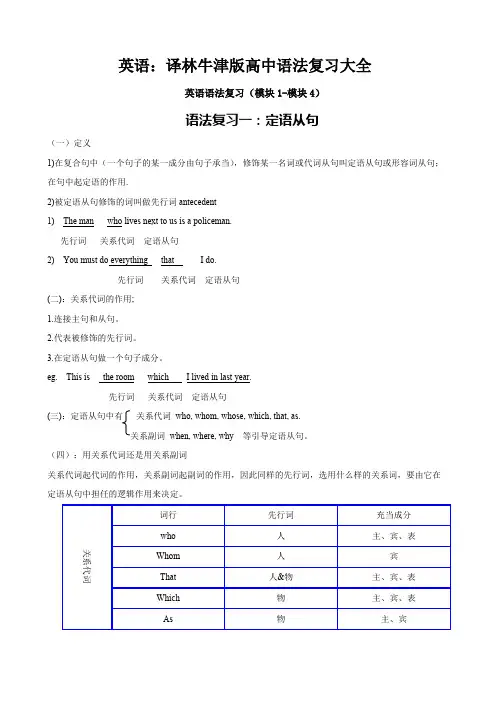
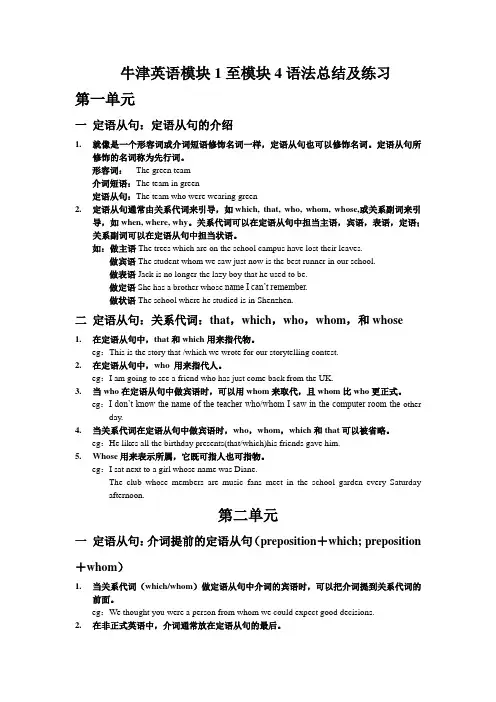
牛津英语模块1至模块4语法总结及练习第一单元一定语从句:定语从句的介绍1.就像是一个形容词或介词短语修饰名词一样,定语从句也可以修饰名词。
定语从句所修饰的名词称为先行词。
形容词:The green team介词短语:The team in green定语从句:The team who were wearing green2.定语从句通常由关系代词来引导,如which, that, who, whom, whose,或关系副词来引导,如when, where, why。
关系代词可以在定语从句中担当主语,宾语,表语,定语;关系副词可以在定语从句中担当状语。
如:做主语The trees which are on the school campus have lost their leaves.做宾语The student whom we saw just now is the best runner in our school.做表语Jack is no longer the lazy boy that he used to be.做定语She has a brother whose name I can’t remember.做状语The school where he studied is in Shenzhen.二定语从句:关系代词:that,which,who,whom,和whose1.在定语从句中,that和which用来指代物。
eg:This is the story that /which we wrote for our storytelling contest.2.在定语从句中,who 用来指代人。
eg:I am going to see a friend who has just come back from the UK.3.当who在定语从句中做宾语时,可以用whom来取代,且whom比who更正式。
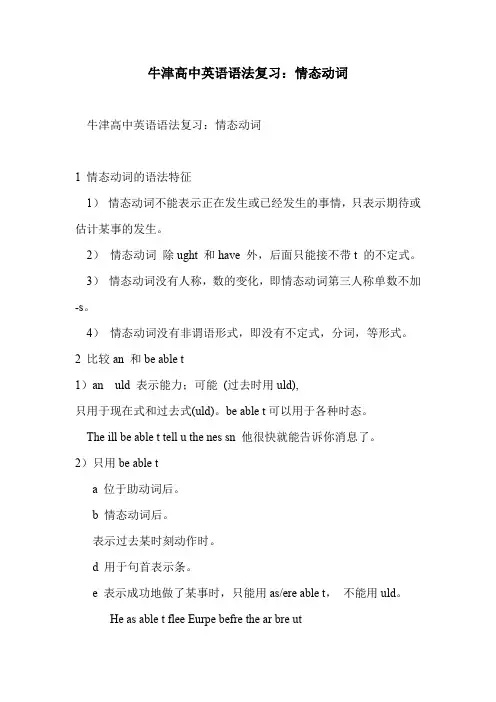
牛津高中英语语法复习:情态动词牛津高中英语语法复习:情态动词1 情态动词的语法特征1)情态动词不能表示正在发生或已经发生的事情,只表示期待或估计某事的发生。
2)情态动词除ught 和have 外,后面只能接不带t 的不定式。
3)情态动词没有人称,数的变化,即情态动词第三人称单数不加-s。
4)情态动词没有非谓语形式,即没有不定式,分词,等形式。
2 比较an 和be able t1)an uld 表示能力;可能(过去时用uld),只用于现在式和过去式(uld)。
be able t可以用于各种时态。
The ill be able t tell u the nes sn 他很快就能告诉你消息了。
2)只用be able ta 位于助动词后。
b 情态动词后。
表示过去某时刻动作时。
d 用于句首表示条。
e 表示成功地做了某事时,只能用as/ere able t,不能用uld。
He as able t flee Eurpe befre the ar bre ut= He anaged t flee Eurpe befre the ar bre ut注意:uld不表示时态1)提出委婉的请求,(注意在回答中不可用uld)。
--- uld I have the televisin n?--- es, u an / N, u an’t2)在否定,疑问句中表示推测或怀疑。
He uldn’t be a bad an他不大可能是坏人。
3 比较a和ight1)表示允许或请求;表示没有把握的推测;a 放在句首,表示祝愿。
a Gd bless u!He ight be at he注意:ight 表示推测时,不表示时态。
只是可能性比a 小。
2)成语:a/ight as ell,后面接不带t 的不定式,意为”不妨”。
If that is the ase, e a as ell tr典型例题Peter ___e ith us tnight, but he isn’t ver sure etA ustB a an D ill答案B 表可能性只能用a此句意可从后半句推出。
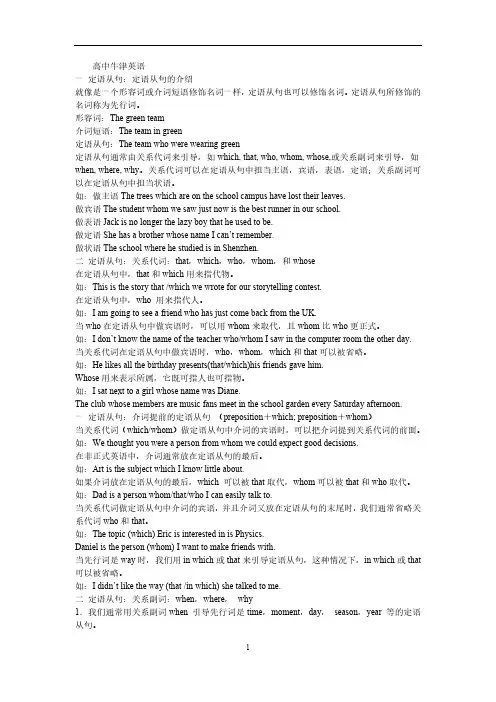
高中牛津英语一定语从句:定语从句的介绍就像是一个形容词或介词短语修饰名词一样,定语从句也可以修饰名词。
定语从句所修饰的名词称为先行词。
形容词:The green team介词短语:The team in green定语从句:The team who were wearing green定语从句通常由关系代词来引导,如which, that, who, whom, whose,或关系副词来引导,如when, where, why。
关系代词可以在定语从句中担当主语,宾语,表语,定语;关系副词可以在定语从句中担当状语。
如:做主语The trees which are on the school campus have lost their leaves.做宾语The student whom we saw just now is the best runner in our school.做表语Jack is no longer the lazy boy that he used to be.做定语She has a brother whose name I can’t remember.做状语The school where he studied is in Shenzhen.二定语从句:关系代词:that,which,who,whom,和whose在定语从句中,that和which用来指代物。
如:This is the story that /which we wrote for our storytelling contest.在定语从句中,who 用来指代人。
如:I am going to see a friend who has just come back from the UK.当who在定语从句中做宾语时,可以用whom来取代,且whom比who更正式。
如:I don’t know the name of the teacher who/whom I saw in the computer room the other day.当关系代词在定语从句中做宾语时,who,whom,which和that可以被省略。
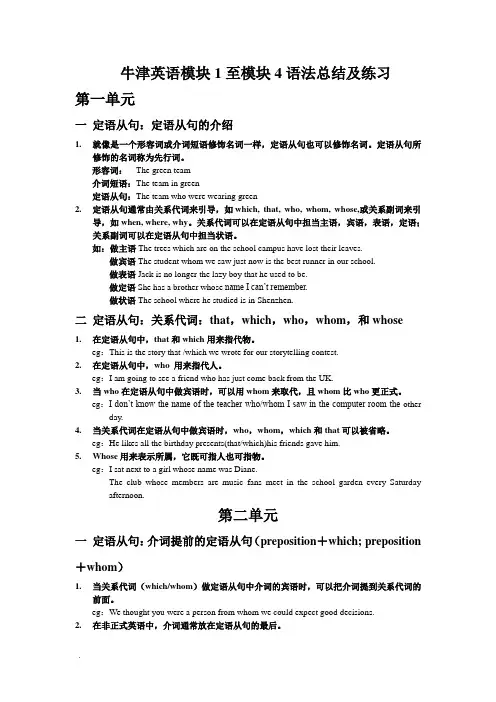
牛津英语模块1至模块4语法总结及练习第一单元一定语从句:定语从句的介绍1.就像是一个形容词或介词短语修饰名词一样,定语从句也可以修饰名词。
定语从句所修饰的名词称为先行词。
形容词:The green team介词短语:The team in green定语从句:The team who were wearing green2.定语从句通常由关系代词来引导,如which, that, who, whom, whose,或关系副词来引导,如when, where, why。
关系代词可以在定语从句中担当主语,宾语,表语,定语;关系副词可以在定语从句中担当状语。
如:做主语The trees which are on the school campus have lost their leaves.做宾语The student whom we saw just now is the best runner in our school.做表语Jack is no longer the lazy boy that he used to be.做定语She has a brother whose name I can’t remember.做状语The school where he studied is in Shenzhen.二定语从句:关系代词:that,which,who,whom,和whose1.在定语从句中,that和which用来指代物。
eg:This is the story that /which we wrote for our storytelling contest.2.在定语从句中,who 用来指代人。
eg:I am going to see a friend who has just come back from the UK.3.当who在定语从句中做宾语时,可以用whom来取代,且whom比who更正式。
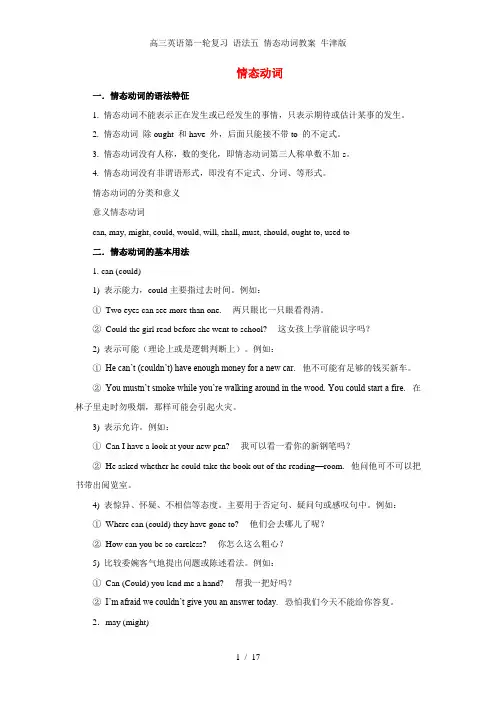
情态动词一.情态动词的语法特征1. 情态动词不能表示正在发生或已经发生的事情,只表示期待或估计某事的发生。
2. 情态动词除ought 和have 外,后面只能接不带to 的不定式。
3. 情态动词没有人称,数的变化,即情态动词第三人称单数不加-s。
4. 情态动词没有非谓语形式,即没有不定式、分词、等形式。
情态动词的分类和意义意义情态动词can, may, might, could, would, will, shall, must, should, ought to, used to二.情态动词的基本用法1. can (could)1) 表示能力,could主要指过去时间。
例如:①Two eyes can see more than one. 两只眼比一只眼看得清。
②Could the girl read before she went to school? 这女孩上学前能识字吗?2) 表示可能(理论上或是逻辑判断上)。
例如:①He can’t (couldn’t) have enough money for a new car. 他不可能有足够的钱买新车。
②You mustn’t smoke while you’re walking around in the wood. You could start a fire. 在林子里走时勿吸烟,那样可能会引起火灾。
3) 表示允许。
例如:①Can I have a look at your new pen? 我可以看一看你的新钢笔吗?②He asked whether he could take the book out of the reading—room. 他问他可不可以把书带出阅览室。
4) 表惊异、怀疑、不相信等态度。
主要用于否定句、疑问句或感叹句中。
例如:①Where can (could) they have gone to? 他们会去哪儿了呢?②How can you be so careless? 你怎么这么粗心?5) 比较委婉客气地提出问题或陈述看法。
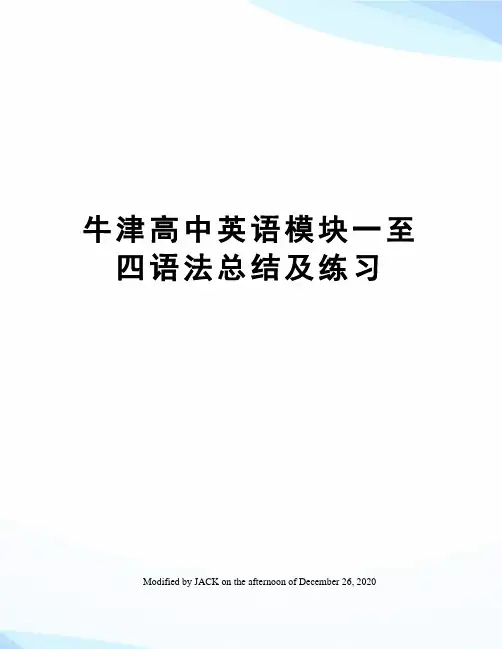
牛津高中英语模块一至四语法总结及练习Modified by JACK on the afternoon of December 26, 2020牛津英语模块1至模块4语法总结及练习第一单元一定语从句:定语从句的介绍1.就像是一个形容词或介词短语修饰名词一样,定语从句也可以修饰名词。
定语从句所修饰的名词称为先行词。
形容词:The green team介词短语:The team in green定语从句:The team who were wearing green2.定语从句通常由关系代词来引导,如which, that, who, whom, whose,或关系副词来引导,如when, where, why。
关系代词可以在定语从句中担当主语,宾语,表语,定语;关系副词可以在定语从句中担当状语。
如:做主语The trees which are on the school campus have lost their leaves.做宾语The student whom we saw just now is the best runner in our school.做表语Jack is no longer the lazy boy that he used to be.做定语She has a brother whose name I can’t remember.做状语The school where he studied is in Shenzhen.二定语从句:关系代词:that,which,who,whom,和whose1.在定语从句中,that和which用来指代物。
eg:This is the story that /which we wrote for our storytelling contest.2.在定语从句中,who 用来指代人。
eg:I am going to see a friend who has just come back from the UK.3.当who在定语从句中做宾语时,可以用whom来取代,且whom比who更正式。
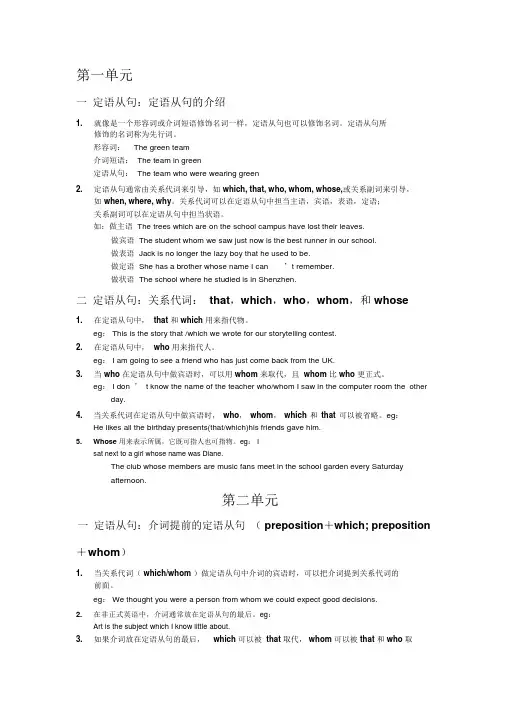
第一单元一定语从句:定语从句的介绍1.就像是一个形容词或介词短语修饰名词一样,定语从句也可以修饰名词。
定语从句所修饰的名词称为先行词。
形容词: The green team介词短语: The team in green定语从句: The team who were wearing green2.定语从句通常由关系代词来引导,如 which, that, who, whom, whose,或关系副词来引导,如 when, where, why。
关系代词可以在定语从句中担当主语,宾语,表语,定语;关系副词可以在定语从句中担当状语。
如:做主语 The trees which are on the school campus have lost their leaves.做宾语 The student whom we saw just now is the best runner in our school.做表语 Jack is no longer the lazy boy that he used to be.做定语 She has a brother whose name I can’t remember.做状语 The school where he studied is in Shenzhen.二定语从句:关系代词: that,which,who,whom,和 whose1.在定语从句中, that 和 which 用来指代物。
eg: This is the story that /which we wrote for our storytelling contest.2.在定语从句中, who 用来指代人。
eg: I am going to see a friend who has just come back from the UK.3.当 who 在定语从句中做宾语时,可以用whom 来取代,且 whom 比 who 更正式。
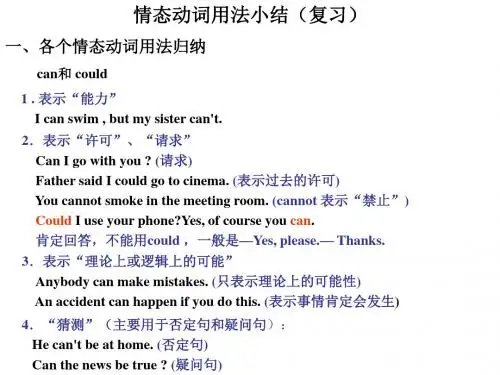
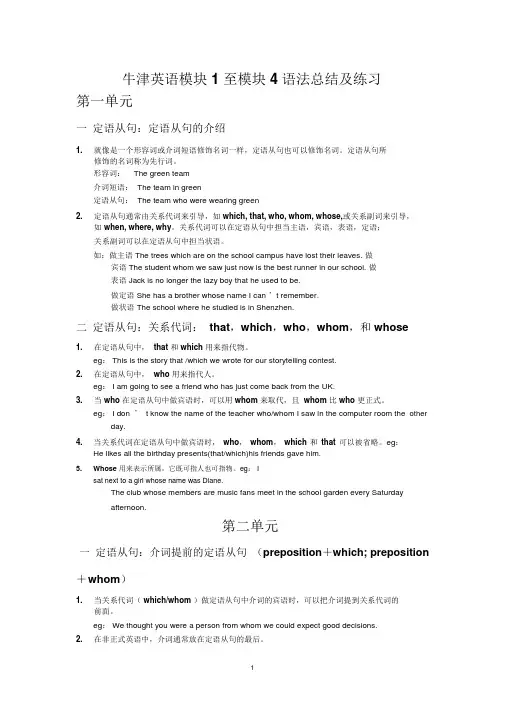
牛津英语模块 1 至模块 4 语法总结及练习第一单元一定语从句:定语从句的介绍1.就像是一个形容词或介词短语修饰名词一样,定语从句也可以修饰名词。
定语从句所修饰的名词称为先行词。
形容词: The green team介词短语: The team in green定语从句: The team who were wearing green2.定语从句通常由关系代词来引导,如 which, that, who, whom, whose,或关系副词来引导,如 when, where, why。
关系代词可以在定语从句中担当主语,宾语,表语,定语;关系副词可以在定语从句中担当状语。
如:做主语 The trees which are on the school campus have lost their leaves. 做宾语 The student whom we saw just now is the best runner in our school. 做表语 Jack is no longer the lazy boy that he used to be.做定语 She has a brother whose name I can ’t remember.做状语 The school where he studied is in Shenzhen.二定语从句:关系代词: that,which,who,whom,和 whose1.在定语从句中, that 和 which 用来指代物。
eg: This is the story that /which we wrote for our storytelling contest.2.在定语从句中, who 用来指代人。
eg: I am going to see a friend who has just come back from the UK.3.当 who 在定语从句中做宾语时,可以用whom 来取代,且 whom 比 who 更正式。
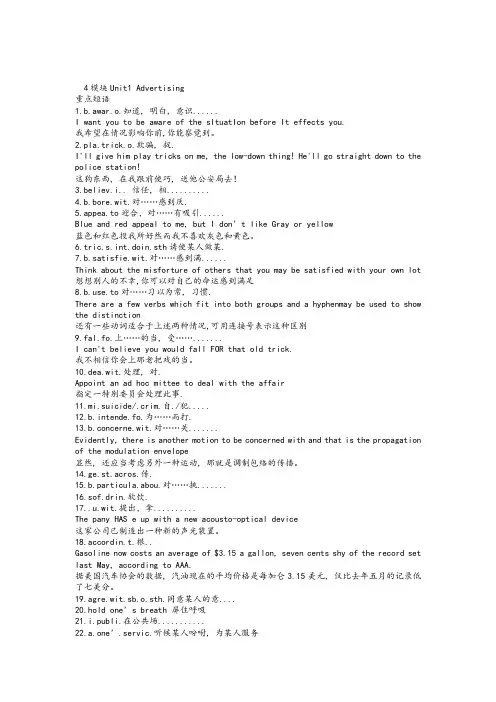
4模块Unit1 Advertising重点短语1.b.awar.o.知道, 明白, 意识......I want you to be aware of the sItuatIon before It effects you.我希望在情况影响你前,你能察觉到。
2.pla.trick.o.欺骗, 捉.I'll give him play tricks on me, the low-down thing! He'll go straight down to the police station!这狗东西, 在我跟前使巧, 送他公安局去!3.believ.i.. 信任, 相..........4.b.bore.wit.对……感到厌.5.appea.to迎合,对……有吸引......Blue and red appeal to me, but I don’t like Gray or yellow蓝色和红色投我所好然而我不喜欢灰色和黄色。
6.tric.s.int.doin.sth诱使某人做某.7.b.satisfie.wit.对……感到满......Think about the misforture of others that you may be satisfied with your own lot 想想别人的不幸,你可以对自己的命运感到满足e.to对……习以为常, 习惯.There are a few verbs which fit into both groups and a hyphenmay be used to show the distinction还有一些动词适合于上述两种情况,可用连接号表示这种区别9.fal.fo.上……的当, 受…….......I can't believe you would fall FOR that old trick.我不相信你会上那老把戏的当。
情态动词一.情态动词类型:1)只作情态动词:must, can(could), may(might), ought to2)可作情态动词也可作实义动词:need, dare3)可作情态动词,也可作助动词:shall(should), will(would)二.情态动词分别讲解1)“必须,一定要”可用于肯定句,表示说话人的主观意志,否定句表示禁止听话人干某事,疑问句中表示征求听话人意见,是否必要做某事。
We must be confident in ourselves.You mustn’t smoke in the classroom.--Must we hand in our exercise in class--Yes, you must. / No, you needn’t/ don’t have to.2)表推测,“必然,必定”只用于肯定句,不用于疑问否定句中。
(1) 现在的肯定推测:must do He must be mad.(2) 现在正在进行的动作:must be doing They must be waiting for us.(3)过去的肯定推测:must have done The door is locked. They must have left.3)“偏要,硬要”表示不耐烦。
Must you smoke here1)“能,会”强调人和动物所具有的能力。
Ducks can swim. I can speak English.2)“可以,许可”You can smoke here.3)表示事物发生的可能性,表“推测”。
肯定句:理论上、客观上的可能性。
Jiangsu can be warm in July.疑问句或否定:具体事实的可能性。
表示疑惑,惊讶或者不相信的意思。
How can he be rude to you1)can的过去式:“可能,许可”He told me that he could lift more than 100 kilograms.The teacher tome me that I could hand in my homework later.2)could提要求,比can更委婉。
2018高考牛津高中英语-模块一至模块十语法牛津高中英语-模块一第一单元一定语从句:定语从句的介绍∙就像是一个形容词或介词短语修饰名词一样,定语从句也可以修饰名词。
定语从句所修饰的名词称为先行词。
形容词:The green team介词短语:The team in green定语从句:The team who were wearing green∙定语从句通常由关系代词来引导,如which, that, who, whom, whose,或关系副词来引导,如when, where, why。
关系代词可以在定语从句中担当主语,宾语,表语,定语;关系副词可以在定语从句中担当状语。
如:做主语The trees which are on the school campus have lost their leaves.做宾语The student whom we saw just now is the best runner in our school.做表语Jack is no longer the lazy boy that he used to be.做定语She has a brother whose name I can’t remember.做状语The school where he studied is in Shenzhen.二定语从句:关系代词:that,which,who,whom,和whose∙在定语从句中,that和which用来指代物。
如:This is the story that /which we wrote for our storytelling contest.∙在定语从句中,who 用来指代人。
如:I am going to see a friend who has just come back from the UK.∙当who在定语从句中做宾语时,可以用whom来取代,且whom比who 更正式。
(直打版)2牛津高中英语模块一至四语法总结及练习(word版可编辑修改)编辑整理:尊敬的读者朋友们:这里是精品文档编辑中心,本文档内容是由我和我的同事精心编辑整理后发布的,发布之前我们对文中内容进行仔细校对,但是难免会有疏漏的地方,但是任然希望((直打版)2牛津高中英语模块一至四语法总结及练习(word版可编辑修改))的内容能够给您的工作和学习带来便利。
同时也真诚的希望收到您的建议和反馈,这将是我们进步的源泉,前进的动力。
本文可编辑可修改,如果觉得对您有帮助请收藏以便随时查阅,最后祝您生活愉快业绩进步,以下为(直打版)2牛津高中英语模块一至四语法总结及练习(word版可编辑修改)的全部内容。
牛津英语模块1至模块4语法总结及练习第一单元一定语从句:定语从句的介绍1.就像是一个形容词或介词短语修饰名词一样,定语从句也可以修饰名词。
定语从句所修饰的名词称为先行词.形容词:The green team介词短语:The team in green定语从句:The team who were wearing green2.定语从句通常由关系代词来引导,如which, that, who, whom, whose,或关系副词来引导,如when, where, why。
关系代词可以在定语从句中担当主语,宾语,表语,定语;关系副词可以在定语从句中担当状语。
如:做主语The trees which are on the school campus have lost their leaves。
做宾语The student whom we saw just now is the best runner in our school。
做表语Jack is no longer the lazy boy that he used to be.做定语She has a brother whose name I can’t remember.做状语The school where he studied is in Shenzhen.二定语从句:关系代词:that,which,who,whom,和whose1.在定语从句中,that和which用来指代物.eg:This is the story that /which we wrote for our storytelling contest。
2018高考牛津高中英语-模块一至模块十语法牛津高中英语-模块一第一单元一定语从句:定语从句的介绍•就像是一个形容词或介词短语修饰名词一样,定语从句也可以修饰名词。
定语从句所修饰的名词称为先行词。
形容词:The green team介词短语:The team in green定语从句:The team who were wearing green•定语从句通常由关系代词来引导,如which, that,who,whom,whose,或关系副词来引导,如when,where, why。
关系代词可以在定语从句中担当主语,宾语,表语,定语;关系副词可以在定语从句中担当状语。
如:做主语The trees which are on the school campus have lost their leaves。
做宾语The student whom we saw just now is the best runner in our school.做表语Jack is no longer the lazy boy that he used to be.做定语She has a brother whose name I can’t remember.做状语The school where he studied is in Shenzhen。
二定语从句:关系代词:that,which,who,whom,和whose•在定语从句中,that和which用来指代物。
如:This is the story that /which we wrote for our storytelling contest.•在定语从句中,who 用来指代人.如:I am going to see a friend who has just come back from the UK。
•当who在定语从句中做宾语时,可以用whom来取代,且whom比who 更正式.如:I don’t know the name of the teacher who/whom I saw in the computer room the other day。
牛津高中英语语法复习(模块1-模块4)语法复习五:情态动词1 情态动词的语法特征1)情态动词不能表示正在发生或已经发生的事情,只表示期待或估计某事的发生。
2)情态动词除ought 和have 外,后面只能接不带to 的不定式。
3)情态动词没有人称,数的变化,即情态动词第三人称单数不加-s。
4)情态动词没有非谓语形式,即没有不定式,分词,等形式。
2 比较can 和be able to1)can could 表示能力;可能(过去时用could),只用于现在式和过去式(could)。
be able to可以用于各种时态。
They will be able to tell you the news soon. 他很快就能告诉你消息了。
2)只用be able toa. 位于助动词后。
b. 情态动词后。
c. 表示过去某时刻动作时。
d. 用于句首表示条件。
e. 表示成功地做了某事时,只能用was/were able to,不能用could。
He was able to flee Europe before the war broke out.= He managed to flee Europe before the war broke out.注意:could不表示时态1)提出委婉的请求,(注意在回答中不可用could)。
--- Could I have the television on?--- Yes, you can. / No, you can't.2)在否定,疑问句中表示推测或怀疑。
He couldn't be a bad man.他不大可能是坏人。
3 比较may和might1)表示允许或请求;表示没有把握的推测;may 放在句首,表示祝愿。
May God bless you!He might be at home.注意:might 表示推测时,不表示时态。
只是可能性比may 小。
2)成语:may/might as well,后面接不带to 的不定式,意为"不妨"。
If that is the case, we may as well try.典型例题Peter ___come with us tonight, but he isn't very sure yet.A. mustB. mayC. canD. will答案B. 表可能性只能用may.此句意可从后半句推出。
4 比较have to和must1)两词都是'必须'的意思,have to 表示客观的需要,must 表示说话人主观上的看法,既主观上的必要。
My brother was very ill, so I had to call the doctor in the middle of the night.我弟弟病得很厉害,我只得半夜里把医生请来。
(客观上需要做这件事)He said that they must work hard. 他说他们必须努力工作。
(主观上要做这件事)2)have to有人称、数、时态的变化,而must只有一种形式。
但must 可用于间接引语中表示过去的必要或义务。
He had to look after his sister yesterday.3)在否定结构中:don't have to表示"不必"mustn't表示"禁止",You don't have to tell him about it.你不一定要把此事告诉他。
You mustn't tell him about it.你一定不要把这件事告诉他。
5 must表示推测1) must用在肯定句中表示较有把握的推测,意为"一定"。
2) must表对现在的状态或现在正发生的事情的推测时,must 后面通常接系动词be 的原形或行为动词的进行式。
You have worked hard all day.You must be tired.你辛苦干一整天,一定累了。
(对现在情况的推测判断)He must be working in his office. 他一定在办公室工作呢。
比较:He must be staying there.他现在肯定呆在那里。
He must stay there.他必须呆在那。
3) must 表示对已发生的事情的推测时,must 要接完成式。
I didn't hear the phone. I must have been asleep.我刚才没有听到电话,我想必是睡着了。
4) must表示对过去某时正发生的事情的推测,must 后面要接不定式的完成进行式。
---Why didn't you answer my phone call?---Well, I must have been sleeping, so I didn't hear it.5) 否定推测用can't。
If Tom didn't leave here until five o'clock, he can't be home yet.如果汤姆五点才离开这儿,他此时一定还未到家。
6 表示推测的用法can, could, may, might, must 皆可表示推测,其用法如下:1)情态动词+动词原形。
表示对现在或将来的情况的推测,此时动词通常为系动词。
I don't know where she is, she may be in Wuhan.2)情态动词+动词现在进行时。
表示对现在或将来正在进行的情况进行推测。
At this moment, our teacher must be correcting our exam papers.这时,我们老师想必在批改试卷。
3)情态动词+动词完成时。
表示对过去情况的推测。
We would have finished this work by the end of next December.明年十二月底前我们很可能已完成这项工作了。
The road is wet. It must have rained last night.地是湿的,昨天晚上一定下雨了。
4)情态动词+动词的现在完成进行时。
表示对过去正在发生事情的推测。
Your mother must have been looking for you.你妈妈一定一直在找你。
5)推测的否定形式,疑问形式用can't, couldn't表示。
Mike can't have found his car, for he came to work by bus this morning.迈克一定还没有找回他的车,因为早上他是坐公共汽车来上班的。
注意:could, might表示推测时不表示时态,其推测的程度不如can, may。
7 情态动词+ have +过去分词1) may(might) have + done sth, can (could) have + done sth表示过去,推测过去时间里可能发生的事情。
Philip may (might) have been hurt seriously in the car accident.Philip can (could) have been hurt seriously in the car accident.2)must have +done sth,对过去时间里可能发生的事情的推测,语气较强,具有"肯定","谅必"的意思。
--- Linda has gone to work, but her bicycle is still here.---She must have gone by bus.3) ought to have done sth, should have done sth本应该做某事,而事实上并没有做。
否定句表示"不该做某事而做了"。
You ought to (should) have been more careful in this experiment.He ought not to have thrown the old clothes away.(事实上已扔了。
)ought to 在语气上比should 要强。
4) needn't have done sth本没必要做某事I dressed very warmly for the trip, but I needn't have done so. The weather was hot.5) would like to have done sth本打算做某事I would like to have read the article, but I was very busy then.8 should 和ought toshould 和ought to 都为"应该"的意思,可用于各种人称。
---Ought he to go?---Yes. I think he ought to.表示要求,命令时,语气由should(应该)、had better最好)、must(必须)渐强。
9 had better表示"最好"had better 相当于一个助动词,它只有一种形式,它后面要跟动词原形。
had better do sthhad better not do sthIt is pretty cold. You'd better put on my coat.She'd better not play with the dog.had better have done sth表示与事实相反的结果,意为"本来最好"。
You had better have come earlier.10 would rather表示"宁愿"would rather dowould rather not dowould rather…than…宁愿……而不愿。
还有would sooner, had rather, had sooner都表示"宁愿"、"宁可"的意思。
If I have a choice, I had sooner not continue my studies at this school.I would rather stay here than go home. = I would stay here rather than go home.典型例题---- Shall we go skating or stay at home?----Which ___ do?A. do you ratherB. would you ratherC. will you ratherD. should you rather答案B。